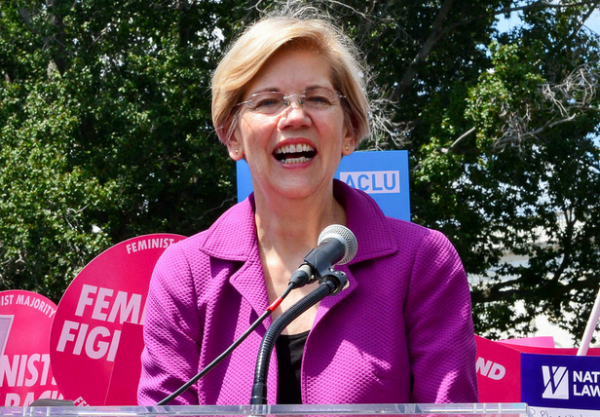Warren Outlines Plan to Cut Big Tech Down to Size

The smarter way to stay on top of broadcasting and cable industry. Sign up below
You are now subscribed
Your newsletter sign-up was successful
Presidential candidate Sen. Elizabeth Warren has made it official. If she is elected, she will try to break up Facebook, Amazon and Google, including by imposing "utility-style" regulation and adopting a form of edge net neutrality.
"[M]y Administration will make big, structural changes to the tech sector to promote more competition — including breaking up Amazon, Facebook, and Google," Warren wrote Friday in outlining her plans to go after Big Tech.
Her plan is to designate large tech companies as "Platform Utilities" and "broken apart from any participant on that platform." For example, she said "Amazon Marketplace, Google’s ad exchange, and Google Search would be platform utilities under this law. Therefore, Amazon Marketplace and Basics, and Google’s ad exchange and businesses on the exchange would be split apart. Google Search would have to be spun off as well."
"Nearly half of all e-commerce goes through Amazon. More than 70% of all Internet traffic goes through sites owned or operated by Google or Facebook," Warren wrote. "Today’s big tech companies have too much power — too much power over our economy, our society, and our democracy.
They’ve bulldozed competition, used our private information for profit, and tilted the playing field against everyone else. And in the process, they have hurt small businesses and stifled innovation."
But she will put a stop to it, she asserts. She would need congressional legislation to create her "Platform Utilities." The legislation would create network neutrality requirements for the edge. "Platform utilities would be required to meet a standard of fair, reasonable, and nondiscriminatory dealing with users," and "would not be allowed to transfer or share data with third parties."
Warren has also come up with a definition of Big Tech: "Companies with an annual global revenue of $25 billion or more and that offer to the public an online marketplace, an exchange, or a platform for connecting third parties would be designated as “platform utilities.”
The smarter way to stay on top of broadcasting and cable industry. Sign up below
Smaller companies ("those with annual global revenue of between $90 million and $25 billion") would also be subject to the platform neutrality standard of "fair, reasonable, and nondiscriminatory dealing with users."
Related: FTC Targets Big Tech for Heightened Scrutiny
Borrowing from the EU privacy enforcement regime, Warren says that any companies found to be violating these requirements would have to pay a fine of 5% of their annual revenue.
Enforcement would be by the trio of federal regulators, state attorneys general and private right of action.
But Warren won't leave it all to Congress. Sounding a bit like candidate Donald Trump's promise to block AT&T-Time Warner and suggestion he wouldn't mind breaking up Comcast-NBCU, Warren said she would appoint regulators committed to reversing anti-competitive tech mergers.
She even offered something of a litmus test for appointees.
"I will appoint regulators who are committed to using existing tools to unwind anti-competitive mergers, including: Amazon: Whole Foods; Zappos; Facebook: WhatsApp; Instagram; and Google: Waze; Nest; DoubleClick."
“As Public Knowledge has repeatedly argued, the time has come to engage in a serious debate about sector-specific regulation of digital platforms," said Charlotte Slaiman, competition policy counsel at Public Knowledge. We need legislation specifically targeted to enhance competition on digital platforms so that there is a real opportunity for new, innovative competitors to succeed. We should proactively promote competition through prohibitions on discrimination, interoperability requirements, and, in some cases, structural separation like Sen. Warren’s plan may be warranted.
“We applaud Sen. Warren’s bold effort to address this problem. We look forward to continuing the conversation and encourage other candidates to offer ideas on how best to promote competition in and among digital platforms.”
Not surprisingly, the Computer & Communications Industry Association (CCIA), whose members include Facebook, Amazon and Google, suggested the plan was misdirected. “The digital sector is a highly competitive part of the U.S. economy, where consumer prices are falling, productivity is rising, and where wages, job creation, and labor share are all outperforming the rest of the economy," said CCIA President Ed Black. "I agree with the Senator that competition enforcement is a critical component of a healthy economy. But this unwarranted and extreme proposal, which focuses on a highly admired and highly performing sector, is misaligned with progressive values, many of which are shared within the tech industry.”
Contributing editor John Eggerton has been an editor and/or writer on media regulation, legislation and policy for over four decades, including covering the FCC, FTC, Congress, the major media trade associations, and the federal courts. In addition to Multichannel News and Broadcasting + Cable, his work has appeared in Radio World, TV Technology, TV Fax, This Week in Consumer Electronics, Variety and the Encyclopedia Britannica.

